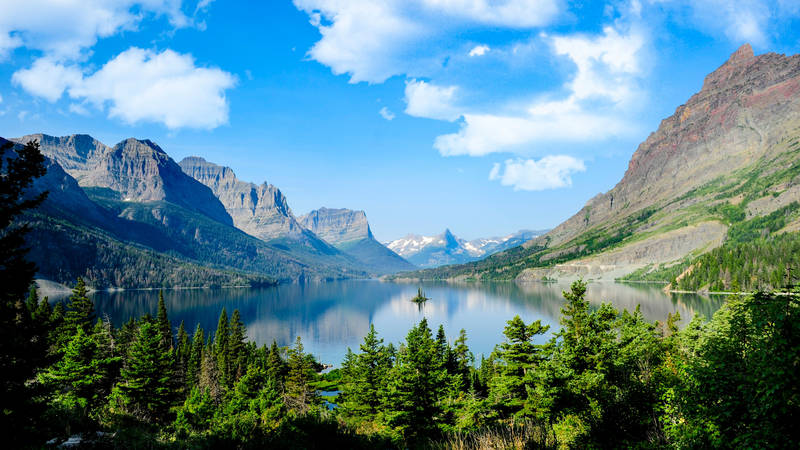“This bipartisan legislation comes at a critical time for our National Park System, as roads, bridges, tunnels and transportation systems are reaching a breaking point at many park sites across the country." - Emily Douce, NPCA's Director of Operations and Park Funding
Washington, DC – Today, the United States Senate Committee on Environment and Public Works passed The Surface Transportation Reauthorization Act of 2021, a bipartisan bill that includes a 21 percent increase in dedicated funding for national parks. The Surface Transportation Reauthorization Act of 2021 would authorize federal highway programs to provide $1.7 billion over five years to repair and modernize crumbling roads, bridges, and transportation systems in national parks across the country. This bill supports major investments to make our nation’s infrastructure more resilient to intensifying climate threats, curbs climate pollution, and puts forward commonsense solutions to help reduce collisions between vehicles and wildlife that move within and beyond park boundaries.
The National Park System is second only to the Department of Defense in the amount of federal infrastructure it manages, including 10,000 miles of publicly accessible roads and 1,440 bridges. Unfortunately, nearly 40 percent of park roads are in poor condition and in need of repair, all while many parks are also dealing with record visitation. By addressing our parks’ transportation needs, we can ensure that visitors have the park experiences they expect and deserve.
Investing in national park infrastructure is not only good for the visitor experience, it also benefits local economies. These places are an important part of the tourism economy generating more than $42 billion for the nation’s economy every year. With national parks supporting more than 340,000 private-sector jobs annually, these economic engines are worthy of a robust infrastructure investment in 2021 and beyond.
Key park provisions included in the bill:
- Guarantees an increase in annual funding to the Park Service – an additional $331 million over the span of the five-year bill – through the Federal Lands Transportation Program, which provides funds to improve roads, bridges and other transportation infrastructure in parks.
- Dedicates $55 million a year and up to $300 million a year for the Nationally Significant Federal Lands and Tribal Projects Program designed to address large repair projects in our parks. Previous projects funded through this program include the reconstruction of the Tamiami Trail in the Everglades and a portion of the Grand Loop Road in Yellowstone.
- Provides $1.4 billion for the Federal Lands Access Program that provides funding to state and local entities to increase transportation and transit access to our federal lands, including national parks.
- Prioritizes sustainable and natural designs to improve the resiliency of park roads and bridges to intensifying climate threats.
- Provides funding to expand electric vehicle charging infrastructure throughout the country, with a focus on underserved and vulnerable communities, including those near national parks.
- Funds updated research into the causes and consequences of wildlife-vehicle collisions, including expanded studies and reports to Congress.
- Establishes a pilot grant program to reduce wildlife-vehicle collisions through projects that protect motorists and wildlife.
Statement by Emily Douce, Director of Operations and Park Funding for the National Parks Conservation Association (NPCA):
“This bipartisan legislation comes at a critical time for our National Park System, as roads, bridges, tunnels and transportation systems are reaching a breaking point at many park sites across the country. We commend Chairman Carper, Ranking Member Capito, Senators Cardin and Cramer, and the rest of the Environment and Public Works Committee for addressing the backlog of transportation projects throughout our country and doing so in a way that curbs climate pollution, prioritizes resilient infrastructure and protects our wildlife and their habitats.
“The more than 320 million people who visit our national parks every year rely on park transportation systems to get them in, out and around our parks, from the more than 460 miles of roads along the Blue Ridge Parkway to the Harelquin Bridge across the Stehekin River at North Cascades National Park to the shuttle buses at Zion National Park. But transportation infrastructure in too many parks is broken, deteriorating, out of date or threatened by intensifying climate change impacts.
“This bill is a big step in the right direction to provide critical funding to repair and protect these systems and ensure millions of visitors can continue to experience and enjoy national parks now and for years to come. However, more work is needed to ensure the public is given a voice in projects that could impact their lands, air and water. And moving forward, we encourage the committee to support funding for transit systems both in and around national parks to help address congestion issues, reduce air pollution that drives climate change and provide more access to local, less visited parks.
“Now, the Senate must work together to pass final legislation that will truly make our parks and communities stronger.”
###
About National Parks Conservation Association: For 100 years, the nonpartisan National Parks Conservation Association has been the leading voice in safeguarding our national parks. NPCA and its more than 1.6 million members and supporters work together to protect and preserve our nation’s most iconic and inspirational places for future generations. For more information, visit www.npca.org/100.


